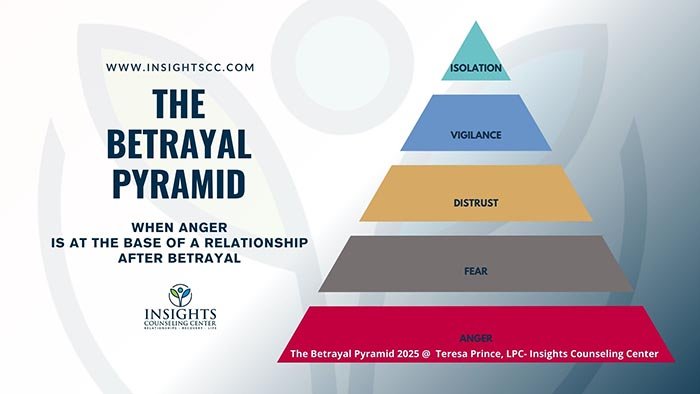
Blog

Introduction to Schema Therapy: A Relational Approach to Deep Change
Schema Therapy goes beyond surface-level change by addressing the deep-rooted patterns that keep us stuck. Discover how this relational approach helps you heal from the inside out.

When Old Survival Strategies Stop Working
Some coping strategies helped you survive—but now they may be keeping you stuck. Learn how Schema Therapy helps uncover old patterns, build a Healthy Adult self, and create more fulfilling relationships.

Mirror Neurons and Shame: Why Watching Others Affects How You See Yourself
Recovery can bring a flood of shame and emotional overwhelm. This blog explores how mirror neurons impact empathy and self-perception in sex addiction—and how healing rewires both.

When Anger Becomes the Foundation: The Betrayal Pyramid
After betrayal, couples often feel emotionally distant and confused. This post introduces the Betrayal Pyramid—a tool we use at Insights Counseling Center to explain what happens beneath the surface, and how to begin healing together.

EFT for the Burnt-Out Parent Couple: Reconnecting in the Chaos
Parenting can leave even the closest couples feeling more like teammates than lovers. When exhaustion and logistics take over, emotional connection often fades—but it doesn’t have to stay that way. This post explores how EFT helps couples rebuild closeness, express needs with vulnerability, and find each other again—even in the chaos. Learn how to shift from surviving to reconnecting.

Book Review: Overcoming Unwanted Intrusive Thoughts
This review explores Overcoming Unwanted Intrusive Thoughts, a must-read for anyone struggling with obsessive or disturbing thoughts. Learn how to respond differently—and more compassionately—to the mind’s noise.

He Made Me Yell, She Made Me Shut Down": Breaking the Cycle of Reactive Conflict
When both partners escalate a conflict, it leads to a destructive cycle known as a "flare-flare." This post explains why it happens, how to recognize your role, and strategies for responding in a healthier, more constructive way.

Learning to Speak from the Heart Instead of Defend from the Hurt
We often lash out or shut down when we most want to feel close. This post explores how Emotionally Focused Therapy helps couples move from defensiveness to deep connection.

Balancing Your Child’s Well-Being and Your Own Self-Care
As a parent, it can feel like your own needs have to take a backseat to your child’s struggles. But in family therapy, we know that supporting your well-being is just as important. Here’s how caring for yourself supports your child’s healing too.

How Therapy Can Help You Navigate Debt Anxiety and Financial Overwhelm
Debt anxiety isn’t just about money—it’s about safety, identity, and hope. Therapy offers a path to rebuild resilience, set boundaries, and face finances with courage.

Is the Difficult Person in Your Life a Narcissist? Understanding the Spectrum of Narcissism
Not all narcissism is toxic, but when it is, it can threaten the foundation of your relationship. Learn how to recognize healthy, moderate, and extreme narcissistic traits—and what to do if you find yourself stuck.

Good Sex vs. Bad Sex? Why All-or-Nothing Thinking Can Sabotage Intimacy
When sex becomes a test of perfection, intimacy suffers. This post explores how all-or-nothing thinking shows up in the bedroom—and how therapy can help you replace pressure with presence.

Turning Toward Bids: The Small Moves That Build Big Connection
In relationships, small moments matter most. Learn what bids for connection are, why turning toward (and enthusiastically turning toward) them builds emotional safety and intimacy, and how to strengthen your relationship one moment at a time with Gottman Method couples therapy.

How to Handle Changes in Sexual Intimacy in Your Relationship
Changes in sexual intimacy are normal, but they don’t have to create distance. Learn why intimacy shifts, how to respond with curiosity and compassion, and when it might be time to seek support. Insights Counseling Center offers therapy for couples, individuals, and those healing after betrayal.

Thoughts Aren’t Threats: 5 Ways Thought-Action Fusion Shows Up in Therapy
This five-part series unpacks Thought-Action Fusion, the belief that simply thinking something makes it dangerous, immoral, or inevitable. We explore how this shows up in OCD, relationships, trauma, sex addiction recovery, and sexual health. Each post offers a clear, compassionate explanation and practical tools from therapy to help you feel more grounded and free in your thoughts.

Unwanted Thoughts, Unwanted Shame: When Thought-Action Fusion Blocks Sexual Freedom
When intrusive or unexpected sexual thoughts cause shame, it's often due to Thought-Action Fusion. This post explores how this pattern affects sexual freedom and how sex therapy helps you navigate it with curiosity and self-acceptance.

“If I Think It, I’ve Already Failed”: Thought-Action Fusion in Sex Addiction Recovery
In sex addiction recovery, thoughts and urges can feel like failure. This post explores how Thought-Action Fusion keeps people stuck in shame—and how healing involves separating thoughts from actions with compassionate clarity.

Book Review: The Body Keeps the Score by Bessel van der Kolk, M.D.
In The Body Keeps the Score, Dr. Bessel van der Kolk explains how trauma changes the nervous system—and why true healing requires more than talk therapy. Drawing from neuroscience, somatic therapies, and clinical insight, this book is essential reading for anyone navigating trauma recovery or supporting those who are.

Trauma Doesn’t Always Look Like What You Expect
Trauma doesn’t always come from one big moment. Sometimes it’s the quiet, chronic pain that lingers for years. In this post, we explore how trauma can show up in subtle ways—and why you don’t need a diagnosis or a dramatic story to deserve healing. If you’ve ever wondered, “Was it really trauma?”—this is for you.

Fearing the Worst: When Thought-Action Fusion Fuels Hypervigilance After Betrayal
For betrayed partners, even thoughts can feel threatening. This post explores how Thought-Action Fusion shows up after betrayal, how it contributes to hypervigilance, and how therapy helps you reclaim emotional safety.
